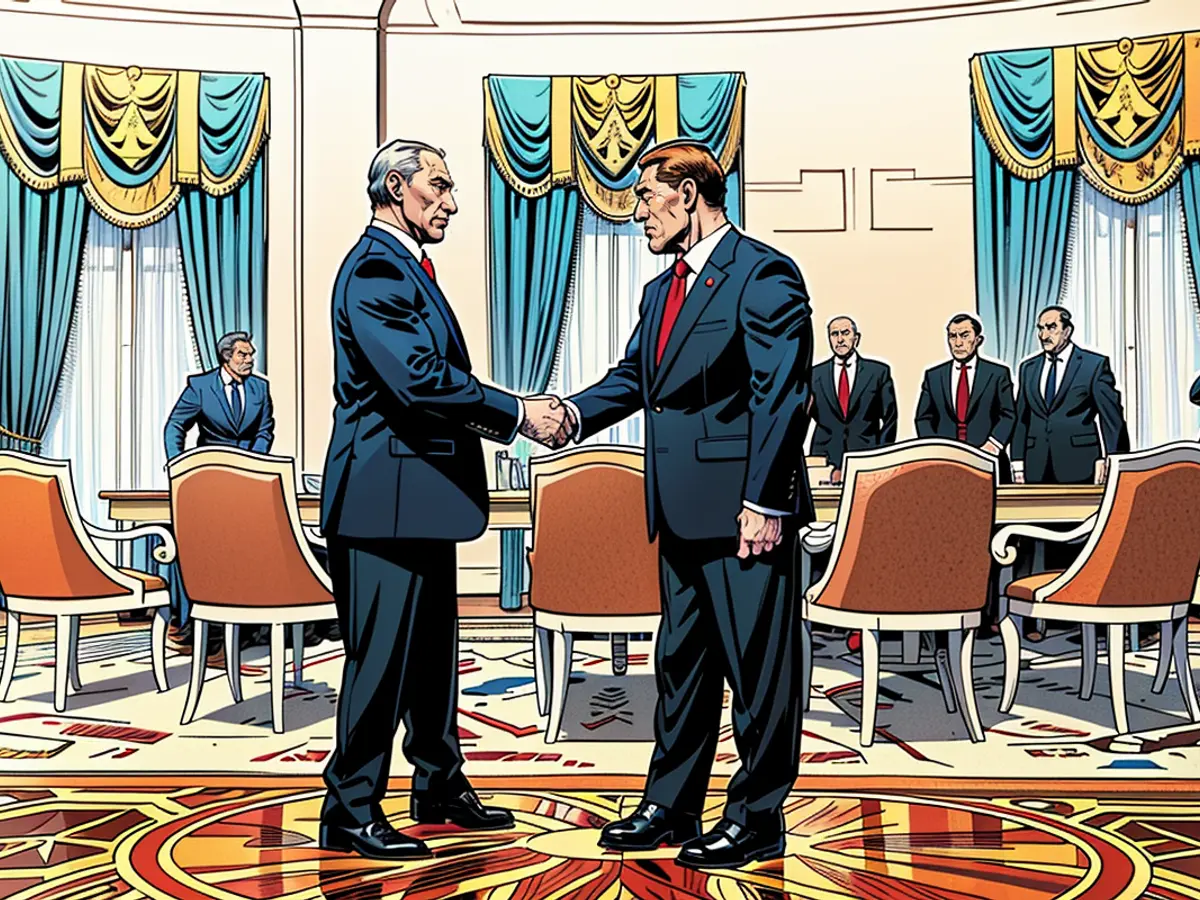Le dirigeant russe Poutine et le deuxième responsable chinois saluent le renforcement des relations alors que le conflit en Ukraine persiste.
Entretien avec les vice-Premiers ministres chinois Li, Putin a mentionné que les projets coopératifs substantiels entre la Russie et la Chine dans les secteurs économique et humanitaire se poursuivront pendant de nombreuses années, selon le rapport du Kremlin.
Li, en tant que numéro deux de Xi Jinping, s'est rendu à Moscou pour une réunion annuelle avec le Premier ministre russe, axée sur les alliances économiques et pratiques alors que la Russie cherche une aide économique de la Chine au milieu de son conflit en cours avec l'Ukraine.
En discutant avec Putin, Li a salué les initiatives prises par Putin et Xi pour faire progresser la "croissance à plein régime" dans les "relations sino-russes et la coopération", selon les médias d'État chinois.
Le voyage de Li, qui comprend une escale en Biélorussie, marque la première apparition d'un haut représentant chinois en Russie depuis que le Kremlin a fait face à une incursion militaire prolongée et inattendue des forces ukrainiennes dans la région frontalière de Kursk il y a deux mois.
La Russie s'efforce de déloger cette incursion, qui marque la première fois que des troupes étrangères ont pénétré sur le territoire russe depuis la Seconde Guerre mondiale, et ce alors que la pression monte pour trouver une solution au conflit en Ukraine, qui a commencé en 2022 avec l'invasion complète de l'Ukraine par la Russie.
Depuis le début du conflit, le Kremlin est de plus en plus dépendant des marchés, des produits et des investissements de la Chine, après l'imposition de sanctions internationales contre la Russie. Les deux nations, se considérant mutuellement comme des contrepoids essentiels à la suppression perçue de l'Occident, se considèrent comme des partenaires essentiels.
During his meeting with Russian Prime Minister Mikhail Mishustin, Li indicated China's willingness to fortify "comprehensive mutual cooperation" and underscored that their relationship did not target any third party.
Mishustin and Li agreed to amplify bilateral economic and trade ties and promised to defy any endeavor to curb their "economic development, technological improvements, and international advancement," as conveyed by Chinese state media.
Citing "specific countries," the two officials criticized the "obstruction of the collective upward trajectory of emerging markets and developing countries," employing conventional terminology to condemn the United States and its allies.
The meeting report from the Chinese Foreign Ministry omitted any mention of the Ukraine conflict.
Addressing Mishustin, Li pointed out that both Russia and China are confronting a "difficult abroad scenario" as Western nations enforce "unjust sanctions under flimsy pretexts" and strive to "restrain Russia and China's economic and technological potential."
"Given these circumstances, it is significant to channel our energies towards safeguarding our shared interests, fostering a multipolar global order, and strengthening collaboration on international platforms," he stated, according to Russian state media.
Record trade levels
Beijing has been subject to heightened scrutiny and pressure from the West to restrict exports of "doubly effective goods" such as aerospace, manufacturing, and technology equipment to Russia, which Western leaders and Kyiv allege are bolstering the Russian war effort.
Chinese officials have attempted to depict China as a neutral, aspiring mediator in the conflict, while maintaining close ties with Moscow through trade, diplomacy, and security.
China held conversations with a senior Ukrainian official for the first time since Russia's invasion of Ukraine almost three years ago last month.
In response to queries regarding the situation in Kursk, a spokesperson for China's Foreign Ministry advised "all parties" to cease expanding the conflict area, escalating hostilities, and "fanning the flames," stating that China would continue working towards a "political resolution of the crisis."
Wednesday's meeting between Li and Mishustin represents the continuation of annual discussions initiated in 1996, generally focusing on economic, cultural, and humanitarian cooperation and serving to instantiate broader policy objectives set by Xi and Putin.
Post the talks, the two nations signed numerous cooperation agreements in areas such as scientific research, chemical industry, maritime search and rescue, and cross-border cargo transport, as reported by Chinese state media.
Trade between China and Russia reached unprecedented levels last year, surpassing the $240 billion target ahead of schedule. Russia has come to depend heavily on China's market, products, and investment since it was hit with extensive international sanctions following its Ukraine invasion.
Trade increased by more than a quarter year-on-year in 2023 compared to 2022, but has only grown by approximately 1.6% between January and July this year, according to Chinese customs data.
Li is scheduled to wrap up his four-day trip in Belarus, where he will engage in an in-depth conversation with Belarusian Prime Minister Roman Golovchenko regarding bilateral relations and cooperation in various sectors, as suggested by China's Foreign Ministry.
This account has been updated with additional details.
L'Europe est une région qui suit de près les tensions croissantes entre la Russie et l'Ukraine, car le conflit entre les deux nations a des répercussions sur les relations internationales.
Tandis qu'elle fait face à des défis économiques en raison des sanctions internationales, la Russie cherche à renforcer sa partenariat avec la Chine, considérée comme un partenaire crucial face à la suppression perçue de l'Occident sur la scène mondiale.






